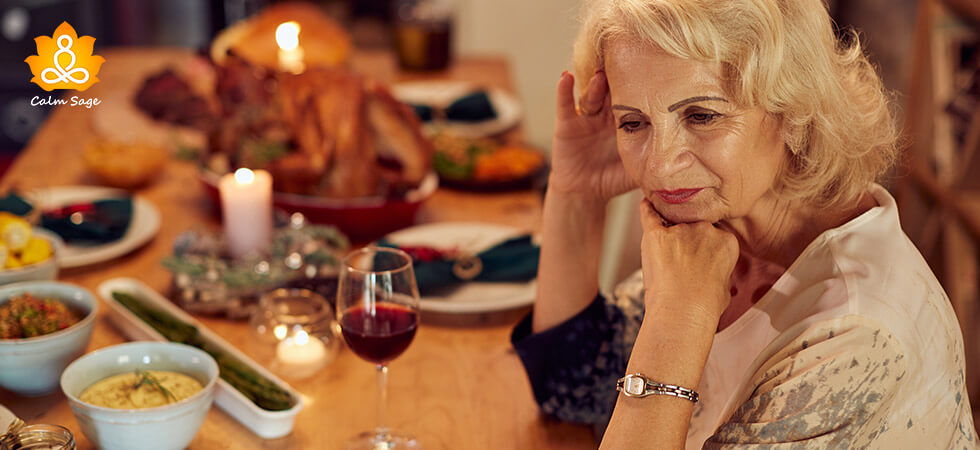Thanksgiving Depression: Can It Be Real? (And How To Cope With It)

The Holiday season is upon us! Wow, hasn’t this year been exciting!? For me, it was as exciting as the last two years, but that’s me. All of this apart, the holiday season is exciting, and we all look forward to it, but many still struggles, especially during the holidays.
While many of us might look forward to vacation time, time with family and friends, gift-giving, and all those delicious meals, some people might find holidays emotionally and mentally draining.
Did you know that a survey by APA reported that more than 35% of people dealt with holiday stress? And we all know what increased levels of stress can do to our mental, emotional, and physical health. The higher your stress, the higher your risk of developing anxiety and depression.
Depression during the holidays is real, but curable too. In this blog, we’re exploring the link between depression and Thanksgiving and how you can cope with Thanksgiving depression.
Thanksgiving Depression Is Real
When we talk about depression and Thanksgiving, it is important to understand that any kind of gathering during the holiday can get overwhelming. Even though Thanksgiving is a holiday where we gather around with family and friends to celebrate gratitude, it doesn’t happen all the time just as we expect.
Sometimes, the idea of going home for Thanksgiving can make you break out in stress hives. Many reasons can shadow this depressive-like feeling. Maybe you have a toxic family or a verbally abusive aunt who can’t seem to relax. Maybe you are estranged from your family and prefer social isolation. Or maybe your people can’t accept your sexual orientation.
Whatever the reason could be, if the prospect of Thanksgiving is enough to make you feel depressed and stressed, then it could be the Thanksgiving depression you’re dealing with.
Here are some common depressive symptoms you need to look out for during Thanksgiving;
- Tiredness or low energy
- Not wanting to enjoy activities you previously liked
- Experiencing constant feelings of guilt, worthlessness, or hopelessness
- Seeing a change in relationships – social and personal
- Seeing a change in sleep patterns
- Seeing a change in appetite
- Poor weight management
- Difficulty focusing or making decisions
- Difficulty working
- Being irritable more than usual
- Thoughts of self-harm
- Thoughts of suicide
What Could Cause Thanksgiving Depression?
We are taught to always see the holidays as a time of celebration, but there are times when – even surrounded by family and friends – you can feel alone and desolate. And even though Thanksgiving is a time to be cheerful and grateful, not everyone can enjoy the festival as you do, and the holiday can make them more gloomy than usual.
Every family has a holiday tradition and everyone spends the holidays differently. What the person is going through or has gone through within the year can greatly affect their reason for cheer and gratitude during Thanksgiving.
Here are some common causes of Thanksgiving depression that you should know about;
- Generalized stress
- Emotional or mental fatigue
- Pressures of Holiday obligations
- Financial stress
- High expectations
- Travel stress
- Stressful family gatherings
- Grief or reeling from a loss during the holiday
- Loneliness or social isolation
These symptoms and causes can also be related to a Major depressive disorder diagnosis or Seasonal depression (SAD). Any kind of external factor – in our case, holiday stress, for example – can trigger these disorders.
How To Cope With Thanksgiving Depression?
1. Keep In Touch With Your Support System
Even if you’re traveling this Thanksgiving, try to keep in touch with your support system. Sometimes, all you need to do when struggling with heavy feelings during the holiday season is to talk to someone who understands. Talking to your support system will help you calm your feelings and see that there is support always available.
2. Keep Realistic Expectations
Holidays can be hard but you don’t have to take it all upon yourself. Make sure you keep your expectations as realistic as possible. Ask yourself if your expectations are too unrealistic or whether you’re holding too many expectations from others. Understand how these expectations are making you feel. Is it stressful or helpful?
3. Say “NO” Where Needed
You might not be able to tackle everything on your own, so keep it up and say “NO” when it’s necessary. If you take up so much during the holidays, the stress can become overwhelming so you need to remind yourself that it’s OK to say no.
4. Take A Break From Social Media
Social media can put unnecessary stress on our mental health so try to take a social media break for a stress-free Thanksgiving. Doomscrolling during the holiday can make you want to compare your situation with others and this can only worsen your depressive symptoms.
5. Keep Up With Self-Care
If you’re already struggling with stress, anxiety, and depression this Thanksgiving, then maybe it’s time to ramp up your self-care routine. Check in with yourself and see where you need to focus more this holiday. Maybe some time apart from your family will help or maybe spending some time alone before the festivities begin could be good for you.
6. Talk To A Professional
We often think that the depressive-like symptoms we normally feel during the holiday will go away if we ignore them, however, that isn’t always the case. If you’re struggling with depression during Thanksgiving, then you can benefit from seeking professional help. A therapist can also help you understand if your symptoms are an indication of a depressive disorder or just a seasonal one.
Depending on your diagnosis, a therapist can then help you find the right treatment option. If you’d like to connect with a professional, click on the link below!
If your Thanksgiving depression is keeping you from enjoying the holiday, then it could be a sign to make some lifestyle changes or see a professional for further support. Remember, depression is treatable with the right tools and help.
I hope this article helped you understand the link between depression and Thanksgiving. For more, you can write to us at info@calmsage.com or DM us on social media.
Share your stress-free Thanksgiving tips with us in the comments below!
Take Care and Happy Thanksgiving!!




















